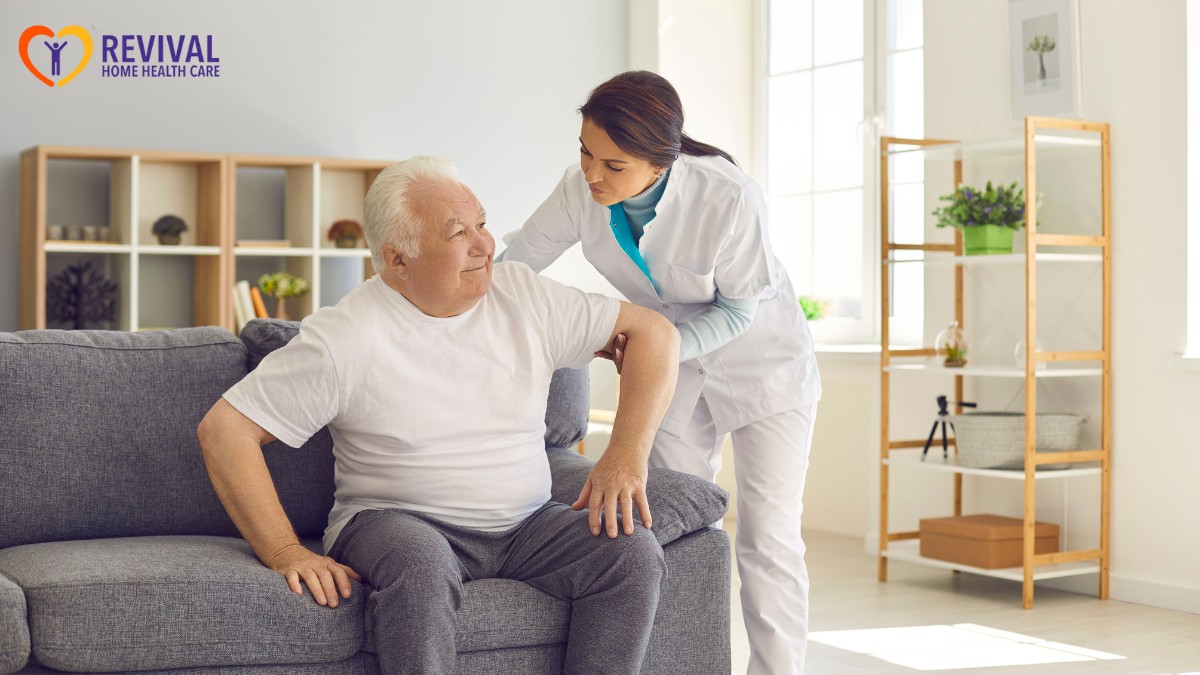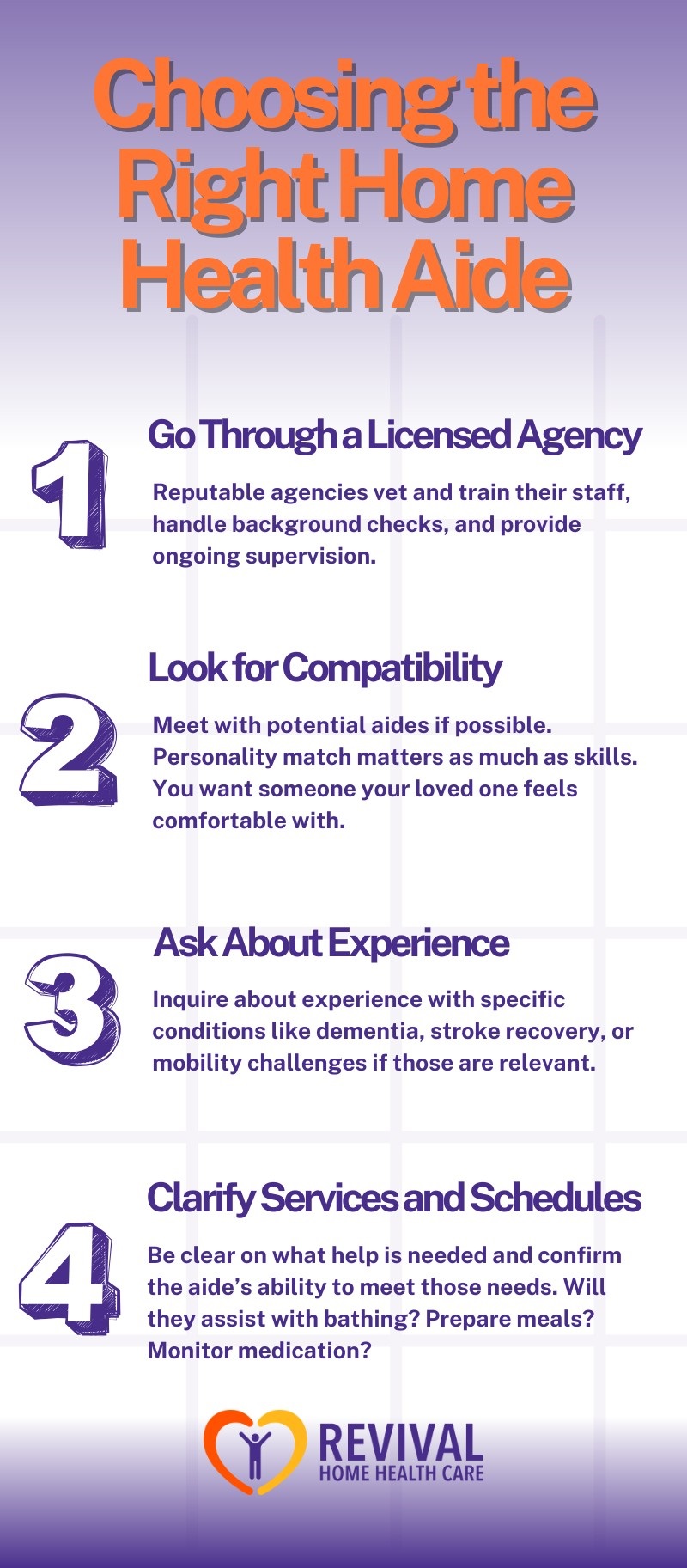Key Points:
- Learn the clear signs that suggest it’s time to consider hiring a home health aide.
- Understand what a home health aide does and how they can support daily living.
- Get practical tips for navigating the decision with your loved one and finding the right help.
Caring for an aging parent or a loved one with a chronic illness can be deeply rewarding, but it can also be emotionally and physically overwhelming. Many families struggle to recognize the moment when everyday tasks become too much for their loved ones—or for themselves—to manage alone.
If you’re wondering whether it’s time to hire a home health aide, you’re not alone. This guide is here to help you understand when professional assistance may be the right next step, what to look for, and how a home health aide can bring peace of mind and renewed quality of life.
Understanding the Role of a Home Health Aide
A home health aide (HHA) is a trained caregiver who provides essential personal care services in the comfort of a person’s home. Their duties often include:
- Assisting with bathing, grooming, and dressing
- Helping with mobility and transfers
- Monitoring vital signs and medication reminders
- Light housekeeping and meal preparation
- Companionship and emotional support
Home health aides are not nurses, but they are invaluable when it comes to supporting daily routines and helping individuals maintain dignity and independence in familiar surroundings.
Signs It Might Be Time to Hire a Home Health Aide
Knowing the right time to bring in outside help can be difficult. However, there are some common indicators that suggest the need for a home health aide:
Decline in Personal Hygiene
One of the first signs is neglect in personal grooming—unbrushed hair, unchanged clothes, body odor, or poor dental care. This often happens not out of neglect but due to physical limitations or memory problems.
Increased Forgetfulness
Mismanaging medications, leaving appliances on, missing appointments, or wandering can be signs of cognitive decline or early dementia. A home health aide can ensure routines are followed safely.
Frequent Falls or Mobility Issues
If your loved one is falling more often or struggling to walk around the house safely, this could point to a need for mobility assistance. HHAs can help reduce fall risk and provide hands-on support.
Unexplained Weight Loss or Poor Nutrition
Struggling to cook, forgetting to eat, or losing interest in meals can lead to malnutrition. Home health aides often assist with meal planning and preparation to ensure consistent, healthy eating.
Housekeeping and Bills Are Overwhelming
You may notice that the home is no longer as clean or organized as it once was, or that bills and mail are piling up. These signs can indicate that managing household tasks has become too difficult.
Caregiver Burnout
If you or another family member has taken on a caregiving role and feels exhausted, overwhelmed, or unable to keep up, it’s time to consider professional help. Caregiver stress can lead to health issues and strained relationships.

Benefits of Hiring a Home Health Aide
Hiring a home health aide doesn’t mean giving up independence—it means gaining support to maintain it.
Support with Daily Living Tasks
Even tasks like bathing or preparing meals can become burdensome over time. HHAs help manage these routine tasks with respect and compassion.
Personalized One-on-One Care
Unlike in a facility, home care is individualized. Aides focus solely on your loved one’s needs in the comfort of their home environment.
Emotional and Social Support
Loneliness can take a toll on health. Home health aides offer companionship, engage clients in conversation, and often become trusted figures in their lives.
Peace of Mind for Family
Having a trained caregiver involved gives family members the reassurance that their loved one is safe and supported, even when they can’t be there in person.
How to Talk to Your Loved One About Hiring Help
This conversation can be sensitive. Your loved one may fear losing control or feel embarrassed. Here are some tips to approach it thoughtfully:
Start Early
Don’t wait for a crisis. Mention the idea gradually, starting when you first notice signs of struggle.
Focus on Independence
Reframe the conversation around maintaining freedom and safety at home, not about what they can’t do.
Include Them in Decisions
Let them help choose the aide, decide on the schedule, and be part of the planning. This fosters cooperation and dignity.
Be Patient
Resistance is normal. Give them time to process, and keep communication open.
Choosing the Right Home Health Aide
Finding the right home care professional is just as important as knowing when to hire one. Here’s how to make a thoughtful choice:

When Temporary Help Turns Into Long-Term Care
Often, families begin with part-time or temporary help—just a few hours a day or week. Over time, they realize how valuable and relieving it is to have someone reliable. If your loved one becomes more dependent, you may consider full-time care or adding other supportive services.
This transition can be smooth when you’ve already built a relationship with a trusted aide. Observing how your loved one responds to the help is a great way to assess long-term needs without making big decisions all at once.
Connect With a Trusted Home Health Aide in New York
If you’re starting to see the signs that your loved one needs more help at home, don’t wait for a crisis to act. A home health aide in New York from Revival Home Health Care can provide compassionate, professional support tailored to your loved one’s unique needs.
Revival Home Health Care has dedicated aides who assist with daily routines, personal care, meal preparation, and companionship—all in the familiar comfort of home. Whether your loved one needs a few hours a week or more frequent help, we’re here to support your family’s peace of mind.
Contact us today to learn how we can help your loved one thrive safely at home with the care and dignity they deserve.


 75 Vanderbilt Ave Staten Island, NY 10304
75 Vanderbilt Ave Staten Island, NY 10304 info@revivalhhc.org
info@revivalhhc.org 718.629.1000
718.629.1000